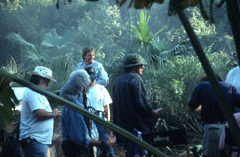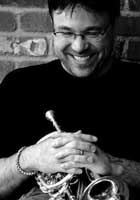Part I: The 4th Annual Beaufort International Film Festival
“You’re so analytical. Sometimes you just have to let art flow over you.” – Nick (William Hurt), The Big Chill, 1983
 The headline in Variety should have been something like “Pandora gets Dear John letter from SC.” As organizers began their final preparations for the fourth iteration of the Beaufort International Film Festival (BIFF), the state’s filmmaking community got a very, very early Christmas present. Final box office numbers for the weekend of February 7th revealed a shocker – the show biz equivalent of Bambi vs. Godzilla with the big guy taking a butt kicking. The film adaptation of Nicholas Sparks’ squishy Dear John had knocked off box office behemoth and all time top-grossing film, Avatar. Okay, so with north of two billion dollars in the bank (and counting), James Cameron and the suits at 20th Century Fox probably aren’t crying in their Grey Goose martinis. But it was cause for celebration in the Palmetto State. “Absolutely,” says State Film Commissioner, Jeff Monks. “That was totally filmed in South Carolina. Here’s a story that was written for a coastal North Carolina town that came here because we can do a small, southern coastal city better. But they also needed Africa, Germany and Afghanistan which we could duplicate within a thirty mile radius of Charleston.” This is essentially the same reason that once seemed to attract blockbusters to the Lowcountry like “no-see-ums” to flesh on a summer’s eve. It doesn’t seem so long ago that our cinematic dance card was filled with high profile partners like Die Hard With a Vengeance, The Prince of Tides and Forrest Gump.
The headline in Variety should have been something like “Pandora gets Dear John letter from SC.” As organizers began their final preparations for the fourth iteration of the Beaufort International Film Festival (BIFF), the state’s filmmaking community got a very, very early Christmas present. Final box office numbers for the weekend of February 7th revealed a shocker – the show biz equivalent of Bambi vs. Godzilla with the big guy taking a butt kicking. The film adaptation of Nicholas Sparks’ squishy Dear John had knocked off box office behemoth and all time top-grossing film, Avatar. Okay, so with north of two billion dollars in the bank (and counting), James Cameron and the suits at 20th Century Fox probably aren’t crying in their Grey Goose martinis. But it was cause for celebration in the Palmetto State. “Absolutely,” says State Film Commissioner, Jeff Monks. “That was totally filmed in South Carolina. Here’s a story that was written for a coastal North Carolina town that came here because we can do a small, southern coastal city better. But they also needed Africa, Germany and Afghanistan which we could duplicate within a thirty mile radius of Charleston.” This is essentially the same reason that once seemed to attract blockbusters to the Lowcountry like “no-see-ums” to flesh on a summer’s eve. It doesn’t seem so long ago that our cinematic dance card was filled with high profile partners like Die Hard With a Vengeance, The Prince of Tides and Forrest Gump.
The fact remains that in the years since that short, sweet “Golden Age,” Hollywood has paid fewer and fewer visits to the state. The reasons boil down to competition and economics. In our corner of the country North Carolina, Georgia, Florida and Louisiana have all aggressively pursued the film and television industry. All four have major studio facilities. South Carolina has none. Most have a network of offices to help attract and support film and television producers with projects in the chute. North Carolina has six regional film offices. Florida has one in every county. South Carolina has four overworked people under the auspices of the Department of Parks, Recreation and Tourism in Columbia. But most importantly, just about every other state in the union offers the tax incentives filmmakers seek out when considering a location (more on that in the next issue). In 2006 the powers-that-be in Columbia used a legislative loophole to drastically slash incentives . The impact was immediate and predictable. “South Carolina fell off the charts,” says Monks. The success of Dear John and festivals like BIFF could help turn things around.
“I am Santini, the Great Santini. I come from behind the moon, out of the dark, unannounced. Watch out!” – Col. Bull Meechum (Robert Duvall), The Great Santini, 1979
 Like Robert Duvall’s incendiary Bull Meechum, the film adaptation of Pat Conroy’s breakthrough novel took critics and Hollywood by surprise. Set in Beaufort and shot in Beaufort, the film garnered Oscar nominations for both Duvall and Michael O’Keefe (see the accompanying interview) and quite literally put the town on Hollywood’s map. It’s said that one of writer/director Lawrence Kasdan’s main reasons for shooting The Big Chill in Beaufort was the opportunity to do it the same house as Santini, Tidalholm. He thought the house had great “bones.” Watching the film un-spool in a Columbia theater back in 1983, I thought the same thing. The house is as much a character as any member of that remarkable ensemble cast, as iconic a piece of Lowcountry film history as the line “Stupid is as stupid does.”
Like Robert Duvall’s incendiary Bull Meechum, the film adaptation of Pat Conroy’s breakthrough novel took critics and Hollywood by surprise. Set in Beaufort and shot in Beaufort, the film garnered Oscar nominations for both Duvall and Michael O’Keefe (see the accompanying interview) and quite literally put the town on Hollywood’s map. It’s said that one of writer/director Lawrence Kasdan’s main reasons for shooting The Big Chill in Beaufort was the opportunity to do it the same house as Santini, Tidalholm. He thought the house had great “bones.” Watching the film un-spool in a Columbia theater back in 1983, I thought the same thing. The house is as much a character as any member of that remarkable ensemble cast, as iconic a piece of Lowcountry film history as the line “Stupid is as stupid does.”
“People still want to know where The Big Chill house is, where The Great Santini was filmed,” says Ron Tucker, Executive Director of the Beaufort International Film Festival. But he adds, the problem with most of Beaufort’s rich film history is just that: it’s history. Santini’s more than three decades down the line. The Big Chill is pushing thirty. The Prince of Tides is nearly old enough to vote. Even Forrest Gump – hands down the biggest thing ever to happen to movie making in South Carolina (and Beaufort in particular) celebrates his sweet sixteen this year, so to speak.
Remembering the past while focusing on the future will be a constant theme as Beaufort approaches it’s tricentennial next January. Working to re-establish and refine the town’s cinematic identity is part of what Tucker hopes the film festival will help engender. “That’s the reason we didn’t change it to the Lowcountry Film Festival,” he explains. “Charleston has theirs, so does Savannah. We want to establish our brand: Beaufort.” 
“It was summer, it was Beaufort, South Carolina and it was all the shrimp you could eat.” – Tom Hanks on shooting Forrest Gump in Beaufort
The fourth BIFF also marks a departure for the event. For the first time the film festival stands alone, independent and unaffiliated with any other occasion or activity. The fledgling Beaufort Film Society (also Tucker’s brainchild) takes the helm. “BFS is going great,” he says. “I think we can be near one hundred and fifty members by the festival. It’s been a great plus as we’ve gone forward with planning. And the membership dues have helped tremendously in defraying the costs of the festival.” Local innkeepers have been supportive, as well, providing rooms for the twenty-odd filmmakers traveling to the Lowcounty from all over the U.S. and farther-flung corners of the earth.
Producer John Schwab will fly in from London for his second consecutive BIFF (see the accompanying interview), this time as a finalist in the feature category with The Hide. A veteran of the festival circuit, he sees great potential in an intimate less corporate-dominated affair like BIFF. “Whether it’s Cannes, Sundance or Beaufort each festival has something to offer to the films that have been submitted,” he says. “Every festival entry generates that much more press and exposure. The films take on a life of their own, which has been our experience with The Hide. Of course, winning an award here and there doesn’t hurt things.”
If a special award were to be handed out “for greatest distance traveled to attend,” Scott Worth’s a mortal lock this year. “From the Blue Mountains of New South Wales to Beaufort the travel time is 63 hours round trip,” he emails. His short documentary, Tira Bakal (or Striking Metal) is also a lock to scare up some controversy. The self-funded film tracks a Filipino family as they continue a decades-old tradition of re-enacting the final trials of Christ with gruesome authenticity. The 25-minute film isn’t for everybody and that’s precisely why he’s crossing the planet to bring it to BIFF. “I travel to different festivals that accept Tira Bakal because they’re looking beyond critical confounds and taking a chance with the audience,” he says. “So I’m spending the money to travel to Beaufort because the festival society has given the audience and the film this value. Also this is a perfect opportunity to visit the South. I’m looking forward to it.”
 Apparently a lot of people were looking forward to it. The final tally on this year’s entries broke two hundred, a festival record. Twenty-two countries are represented across the six categories: Feature, Short, Documentary, Animation, Screenplay and Student. There’s also a distinct Lowcountry presence, as well. Beaufort resident and author, Teresa Bruce’s original script Mask of the Innocent is a finalist in the Screenplay competition. And the Student category was inundated with, well, scads of entries from the Savannah College of Art and Design.
Apparently a lot of people were looking forward to it. The final tally on this year’s entries broke two hundred, a festival record. Twenty-two countries are represented across the six categories: Feature, Short, Documentary, Animation, Screenplay and Student. There’s also a distinct Lowcountry presence, as well. Beaufort resident and author, Teresa Bruce’s original script Mask of the Innocent is a finalist in the Screenplay competition. And the Student category was inundated with, well, scads of entries from the Savannah College of Art and Design.
There will be some celebrity presence (it’s a film festival, there’s a law) and at least one won’t have much farther to travel than Fripp Island. Pat Conroy will receive the festival’s highest honor, The Jean Ribaut Award “in acknowledgment of his outstanding and inspiring original material for film.” He’ll be handed the Ribaut by his friend, Blythe Danner who has portrayed two Conroy women on film, Sally Wingo in The Prince of Tides and Lillian Meechum in The Great Santini. Her Oscar nominated, on-screen son in Santini, Michael O’Keefe, will present Gwyneth’s mom with the festival’s Excellence in Acting Award.
As for the future, Ron Tucker’s goal is to keep the experience intimate, accessible, less corporate and light on celebrity. Don’t expect to see Brad and Angie or the cast of the Twilight saga slinking about amid a pack of snapping paparazzi. This event will always focus on the filmmakers. “They’re the stars,” he says. “This is their time to shine.”
To Be Continued…
Coming in the March 3rd issue:
- The wrap on BIFF and putting Beaufort back on Hollywood’s A-list
- The deeper meaning of Army Wives
- And a candid conversation with oft-filmed author and Beaufort resident, Pat Conroy
Go online:
Email Mark Shaffer at backyardtourist@gmail.com







